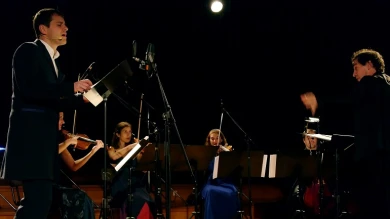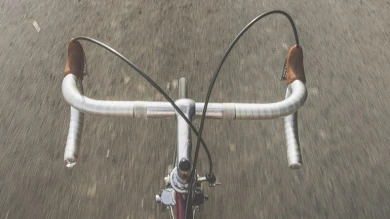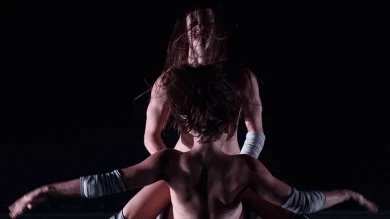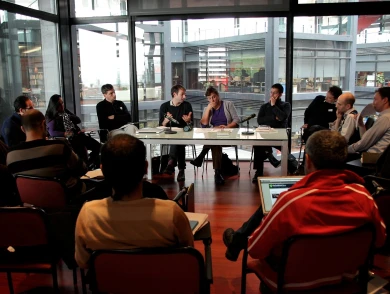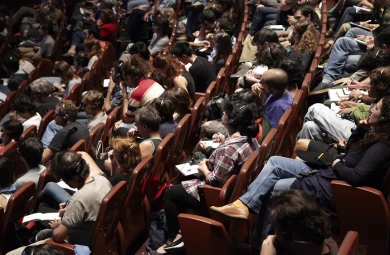-
21 February, 2017 Museo Reina Sofía, Edificio Nouvel, Centro de Estudios
Internal work session
-
22 February, 2017 ARCO Madrid 2017, IFEMA, Forum Auditorium, Pavilion 9, Museum Forum
Museum, culture or industry?
Public debate with João Fernandes, Achim Borchardt-Hume, Catherine David and Gabriel Pérez Barreiro.
Venue: ARCO Madrid 2017, IFEMA, Forum Auditorium, Pavilion 9, Museum Forum
6th Meeting of European and Latin American Museums
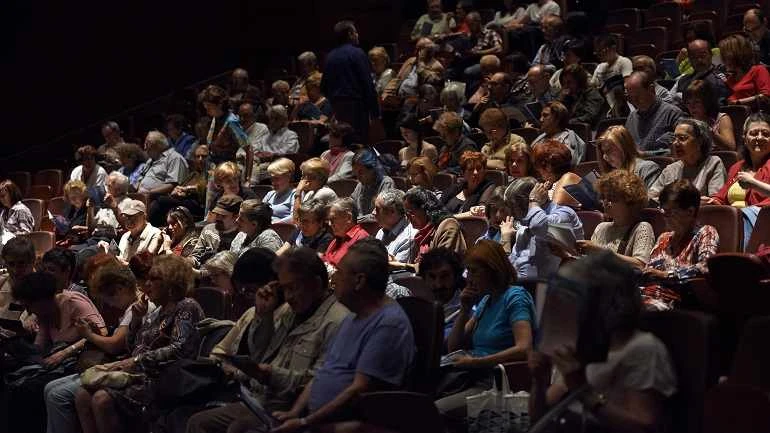
Held on 21 Feb 2017
In conjunction with ARCOMadrid 2017, the Museo Reina Sofía sets up an encounter between different professionals from European and Latin American museum institutions. The aim is to create synergies, promote joint institutional projects and put forth a reflection on the role of museums at the present time.
Today, contemporary art museums face new challenges arising from a globalised society in which the market plays down the legitimising role of the museum institution with respect to the artwork. This premise becomes clear in certain systems of funding which favour the private over the public, and with the ensuing proliferation of auctions, art fairs and other international events that champion private collecting. On the other side, and a by-product of the above, the logic of cultural tourism and the international movement of audiences and viewers imposes visibility as a condition of affirming the museum, reducing its chances of working on key yet also largely invisible aspects, for instance research and the production of knowledge.
Indeed, research is a vital issue in the operation of the contemporary art museum, encompassing diverse and vitally important areas such as the study of collections, the exploration of local and international art contexts, the coordination of internal departments, the programming of public activities and the drawing up of collaborative projects between different institutions. Nevertheless, in view of the constant pressure museums are under, tasks which produce a visible, fast and quantifiable return often take precedence over research. Thus, the event holds sway in the process, imposing a permanent demand of the present and leaving no room for the characteristic temporalities and methodologies in research.
Another aforementioned aspect is the production of knowledge, and its necessity in addressing the role contemporary art museums play in society and the strategies they can adopt to advocate frameworks of critical and collective reflection outside of marketing and performance. Currently, the possibility that new walls diminish and isolate art knowledge and artistic practices is a risk illustrated by recent events such as the US elections, the referendum on Brexit or the resurgence of xenophobic ideas in different parts of the world. This then raises the question: Can the museum be a place of discussion and action on these issues?
The 6th Encounter between European and Latin American Museums seeks to reflect on these unanswered questions by confronting ideas and practices, identifying problems and possibilities, building common projects and opening new perspectives of doing in museum institutions.
In collaboration with
Curatorship
João Fernandes
Organised by
ARCO Madrid 2017 and Museo Reina Sofía
Participants
João Fernandes. Artistic Director, Museo Nacional Centro de Arte Reina Sofía, Madrid
Nekane Aramburu. Director, Es Baluard, Palma de Mallorca
Vicenzo de Bellis. Curator, Walker Art Center, Minneapolis
Catherine David. Deputy Director, National Museum of Modern Art - Centre Pompidou, Paris
Mela Dávila. Director of Public Activities, Museo Reina Sofía, Madrid
Oier Etxeberria Bereziartua. Responsable of Artistic Projects, Tabakalera Centro Internacional de Cultura Contemporánea, San Sebastián
Gabriel Pérez Barreiro. Director, Colección Patricia Phelps Cisneros, New York
Juan Gaitán. Director, Museo Tamayo, Mexico City
Julieta González. Chief Curator and Interim Director, Colección Jumex Arte Contemporáneo, Mexico City
Inti Guerrero. Estrellita B. Brodsky Adjunct Curator of Latin American Art, Tate Modern, London
Nydia Gutiérrez. Chief Curator, Museo de Antioquía, Medellín
Marta Mestre. Curator, Centro de Arte Contemporáneo Inhotim, Brumadinho
Cuauhtémoc Medina. Chief Curator, Museo Universitario Arte Contemporáneo (MUAC), Mexico City
Adriano Pedrosa. Artistic Director, Museu de Arte de São Paulo (MASP), São Paulo
Carlos Prieto del Campo. Director of Studies Centre, Museo Reina Sofía, Madrid
Ane Rodríguez Armendariz. Director, Tabakalera Centro Internacional de Cultura Contemporánea, San Sebastián
Dirk Snauwaert. Director, Wiels. Contemporary Art Centre, Brussels
Más actividades

Institutional Decentralisation
Thursday, 21 May 2026 – 5:30pm
This series is organised by equipoMotor, a group of teenagers, young people and older people who have participated in the Museo Reina Sofía’s previous community education projects, and is structured around four themed blocks that pivot on the monstrous.
This fourth and final session centres on films that take the museum away from its axis and make it gaze from the edges. Pieces that work with that which is normally left out: peripheral territories, unpolished aesthetics, clumsy gestures full of intent. Instead of possessing an institutional lustre, here they are rough, precarious and strange in appearance, legitimate forms of making and showing culture. The idea is to think about what happens when central authority is displaced, when the ugly and the uncomfortable are not hidden, when they are recognised as part of the commons. Film that does not seek to be to one’s liking, but to open space and allow other ways of seeing and inhabiting the museum to enter stage.
![Tracey Rose, The Black Sun Black Star and Moon [La luna estrella negro y negro sol], 2014.](https://recursos.museoreinasofia.es/styles/small_landscape/public/Obra/AD07091_2.jpg.webp)
On Black Study: Towards a Black Poethics of Contamination
Monday 27, Tuesday 28 and Wednesday 29 of April, 2026 – 16:00 h
The seminar On Black Study: Towards a Black Poethics of Contamination proposes Black Study as a critical and methodological practice that has emerged in and against racial capitalism, colonial modernity and institutional capture. Framed through what the invited researcher and practitioner Ishy Pryce-Parchment terms a Black poethics of contamination, the seminar considers what it might mean to think Blackness (and therefore Black Study) as contagious, diffuse and spreadable matter. To do so, it enacts a constellation of diasporic methodologies and black aesthetic practices that harbor “contamination” -ideas that travel through texts, geographies, bodies and histories- as a method and as a condition.
If Blackness enters Western modernity from the position of the Middle Passage and its afterlives, it also names a condition from which alternative modes of being, knowing and relating are continually forged. From within this errant boundarylessness, Black creative-intellectual practice unfolds as what might be called a history of touches: transmissions, residues and socialities that unsettle the fantasy of pure or self-contained knowledge.
Situated within Black radical aesthetics, Black feminist theory and diasporic poetics, the seminar traces a genealogy of Black Study not as an object of analysis but as methodological propositions that continue to shape contemporary aesthetic and political life. Against mastery as the horizon of study, the group shifts attention from what we know to how we know. It foregrounds creative Black methodological practices—fahima ife’s anindex (via Fred Moten), Katherine McKittrick’s expansive use of the footnote, citation as relational and loving labour, the aesthetics of Black miscellanea, and Christina Sharpe’s practices of annotation—as procedures that disorganise dominant regimes of knowledge. In this sense, Black Study is approached not as a discrete academic field but as a feel for knowing and knowledge: a constellation of insurgent practices—reading, gathering, listening, annotating, refusing, world-making—that operate both within and beyond the university.
The study sessions propose to experiment with form in order to embrace how ‘black people have always used interdisciplinary methodologies to explain, explore, and story the world.’ Through engagements with thinkers and practitioners such as Katherine McKittrick, C.L.R. James, Sylvia Wynter, Christina Sharpe, Fred Moten, Tina Campt, Hilton Als, John Akomfrah, fahima ife and Dionne Brand, we ask: What might it mean to study together, incompletely and without recourse to individuation? How might aesthetic practice function as a poethical intervention in the ongoing work of what Sylvia Wynter calls the practice of doing humanness?

Intergenerationality
Thursday, 9 April 2026 – 5:30pm
This series is organised by equipoMotor, a group of teenagers, young people and older people who have participated in the Museo Reina Sofía’s previous community education projects, and is structured around four themed blocks that pivot on the monstrous.
The third session gazes at film as a place from which to dismantle the idea of one sole history and one sole time. From a decolonial and queer perspective, it explores films which break the straight line of past-present-future, which mix memories, slow progress and leave space for rhythms which customarily make no room for official accounts. Here the images open cracks through which bodies, voices and affects appear, disrupting archive and questioning who narrates, and from where and for whom. The proposal is at once simple and ambitious: use film to imagine other modes of remembering, belonging and projecting futures we have not yet been able to live.

Remedios Zafra
Thursday March 19, 2026 - 19:00 h
The José Luis Brea Chair, dedicated to reflecting on the image and the epistemology of visuality in contemporary culture, opens its program with an inaugural lecture by essayist and thinker Remedios Zafra.
“That the contemporary antifeminist upsurge is constructed as an anti-intellectual drive is no coincidence; the two feed into one another. To advance a reactionary discourse that defends inequality, it is necessary to challenge gender studies and gender-equality policies, but also to devalue the very foundations of knowledge in which these have been most intensely developed over recent decades—while also undermining their institutional support: universities, art and research centers, and academic culture.
Feminism has been deeply linked to the affirmation of the most committed humanist thought. Periods of enlightenment and moments of transition toward more just social forms—sustained by education—have been when feminist demands have emerged most strongly. Awareness and achievements in equality increase when education plays a leading social role; thus, devaluing intellectual work also contributes to harming feminism, and vice versa, insofar as the bond between knowledge and feminism is not only conceptual and historical, but also intimate and political.
Today, antifeminism is used globally as the symbolic adhesive of far-right movements, in parallel with the devaluation of forms of knowledge emerging from the university and from science—mistreated by hoaxes and disinformation on social networks and through the spectacularization of life mediated by screens. These are consequences bound up with the primacy of a scopic value that for some time has been denigrating thought and positioning what is most seen as what is most valuable within the normalized mediation of technology. This inertia coexists with techno-libertarian proclamations that reactivate a patriarchy that uses the resentment of many men as a seductive and cohesive force to preserve and inflame privileges in the new world as techno-scenario.
This lecture will address this epochal context, delving into the synchronicity of these upsurges through an additional parallel between forms of patriarchal domination and techno-labor domination. A parallel in which feminism and intellectual work are both being harmed, while also sending signals that in both lie emancipatory responses to today’s reactionary turns and the neutralization of critique. This consonance would also speak to how the perverse patriarchal basis that turns women into sustainers of their own subordination finds its equivalent in the encouraged self-exploitation of cultural workers; in the legitimation of affective capital and symbolic capital as sufficient forms of payment; in the blurring of boundaries between life and work and in domestic isolation; or in the pressure to please and comply as an extended patriarchal form—today linked to the feigned enthusiasm of precarious workers, but also to technological adulation. In response to possible resistance and intellectual action, patriarchy has associated feminists with a future foretold as unhappy for them, equating “thought and consciousness” with unhappiness—where these have in fact been (and continue to be) levers of autonomy and emancipation.”
— Remedios Zafra

27th Contemporary Art Conservation Conference
Wednesday, 4, and Thursday, 5 March 2026
The 27th Contemporary Art Conservation Conference, organised by the Museo Reina Sofía’s Department of Conservation and Restoration, with the sponsorship of the Mapfre Foundation, is held on 4 and 5 March 2026. This international encounter sets out to share and debate experience and research, open new channels of study and reflect on conservation and the professional practice of restorers.
This edition will be held with in-person and online attendance formats, occurring simultaneously, via twenty-minute interventions followed by a five-minute Q&A.
